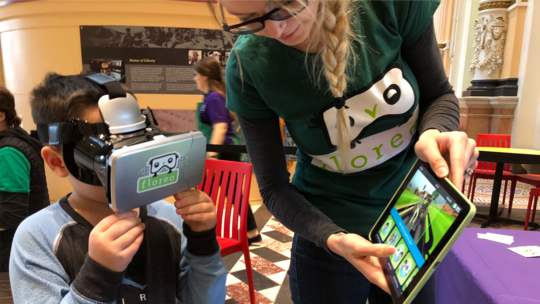
Four years after it launched to help kids with autism using virtual reality, D.C.-based Floreo Inc. wants to serve more people.
The local startup, which has a VR teaching tool to supplement therapy for kids with autism spectrum disorder, or ASD, is now expanding to attention deficit hyperactivity disorder. That’s through a research and development agreement with the National Institutes of Health’s National Human Genome Research Institute to develop and studying modules for children with ADHD.
“When we started Floreo and started developing some of the concepts around using virtual reality as a treatment medium for therapy in autism, we always saw it as the first of what could be a number of health care indications in the behavioral space,” CEO Vijay Ravindran said in an interview.
That the system can be used more widely than autism is already incorporated into its patents, he added. “So really, we were looking for the first A-level research partner to be ready to work with us, and to feel like we had made enough progress in commercializing and growing the autism business, that we had great product-market fit for adoption,” he said.

Breaking into the ADHD market
The NHGRI approached Floreo in fall 2019 to explore how Floreo’s training regimen could be used “to implement some of their ideas and develop a research track and, eventually, commercialize,” Ravindran said. So the organization will fund and run the pilot study with lessons that Floreo develops for it — targeting areas such as impulse control, visual-spatial reasoning, developing working memory and helping sustain attention. The pilot, slated to complete by the second quarter of 2021, would precede a large control trial and potential release.
And because ADHD commonly co-occurs with autism — roughly 40% of kids with autism may have ADHD as well, he said — Floreo’s existing customers could potentially start using its ADHD lessons “once we are satisfied with the safety side coming out of the pilot,” he said.
The move also opens up a new potential revenue stream for Floreo, which at this point counts 40 school districts and autism clinics as customers and expects to grow its business tenfold from 2019 to 2020, Ravindran said. While some existing customers — psychology practices or school systems among them — have ADHD clients already, he sees a larger untapped market. “Beyond looking at the immediate autism population that we’re already serving and growing into, we would then be looking at commercializing into the ADHD space," he said.
Floreo bills itself as a training regimen or treatment program, rather than a therapy, because it not have a regulatory approval at this point. But the company does intend to seek a green light from the Food and Drug Administration to market it as such, at least a year from now “as we look to really widen Floreo’s usage across the broader mental health, behavioral health area,” Ravindran said.
The startup is also exploring the prospect of developing lesson plans for anxiety as well as extending its application for kids with autism into adulthood — programs such as college preparation, job preparedness, independent living and having meaning social relationships. “We see a role for our virtual training technology throughout that lifetime,” Ravindran said
Laying groundwork for more growth
Floreo’s team has been laying the groundwork to support that expansion. They pursued and won an autism waiver from the Maryland Department of Health, which helps establish Floreo as a reimbursable option for children with ASD, including with state Medicaid agencies. The company is now looking to do the same in the District and Virginia, and then more broadly on the East Coast. “We see state Medicaid as really important conduits to a large proportion of kids with ADHD and autism,” Ravindran said.
The business also rolled out and implemented back in March a telehealth model, to make its technology available through the coronavirus pandemic. Previously, a special education teacher, therapist or parent would sit in the same room as the child, monitoring a coaching tablet that reflected what he or she was seeing through the VR headset. Now the specialist can view the child’s sessions through videoconferencing, so nobody has to travel for care. It’s an offering Floreo was already working on in 2019 to serve rural populations that otherwise had limited access to these services.
“This is a market, when it comes to autism therapy, where the demand far outstrips the supply in that we have rising diagnosis rates, we have families waiting on waitlists for sometimes a year-plus for services to start,” Ravindran said. “The creation of more telehealth capabilities, and the fact that health care plans have allowed that telehealth delivery to be reimbursed, opens up a lot of service opportunities to families that have not been getting their needs met.”
The switch to telehealth has helped fuel growth for Floreo in 2020, with new clinics and school districts coming on board, including that of Redlands, California, where they’re deploying headsets to families of special needs kids, Ravindran said.
Floreo has raised $4 million to date including $2.1 million in 2017. The company now has 12 employees and is looking to hire as it gains more Medicaid approvals, Ravindran said. It now has 175 lessons in its system and releases new content each month.
Ravindran previously led product and engineering efforts for Amazon’s (NASDAQ: AMZN) consumer ordering technology, including the launch of Amazon Prime, and was also a senior vice president and chief digital officer at The Washington Post Co.




